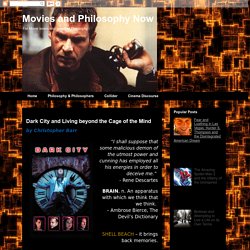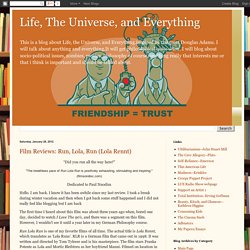

Movies and Philosophy Now: Dark City and Living beyond the Cage of the Mind. By Christopher Barr “I shall suppose that some malicious demon of the utmost power and cunning has employed all his energies in order to deceive me.” - Rene Descartes BRAIN, n.

An apparatus with which we think that we think. – Ambrose Bierce, The Devil’s Dictionary SHELL BEACH – it brings back memories. Dark City is a science fiction, film noir, crime thriller about a man that wakes up in a bathtub full of water and a little blood on his forehead, with no memory as to how or why he arrived in that room, there is just a light bulb swinging above him. John Murdock is the man’s name but he’s not sure if that’s true. Murdock has to evade police as he confronts his wife Emma, who he has no memory of. Philosopher Rene Descartes entertained doubt when it came to his memories and dreams. “They had mastered the ultimate technology, the ability to alter physical reality by will alone.” - Dr.
What is reality? The people of this dystopic city are unaware of any changes. One of the Strangers, Mr. . – Mr. 027_District 9 - Resource for Values Education. Movie%20(Erin%20Brockovich).pdf. Life, The Universe, and Everything: Film Reviews: Run, Lola, Run (Lola Rennt) “Did you run all the way here?”

"The breathless pace of Run Lola Run is positively exhausting, stimulating and inspiring. " (filmsondisc.com) Dedicated to Paul Nnodim Hello. I am back. The first time I heard about this film was about three years ago when, bored one day, decided to watch I Love The 90’s, and there was a segment on this film. Run Lola Run is one of my favorite films of all time. The essential plot of the film is that due to a series of unfortunate events, Manni is potentially in a heap of trouble with an organized crime syndicate. However, though this is the plot, it is essentially not, what the film is about. I really do not want to give too much away because I could easily break the film down scene by scene and explain its genius, however, that could potentially spoil it for most who have not seen it.
The film’s point is focused on the cliché of ripples in the pond, the butterfly effect, etc—that the littlest of things can make the biggest differences. I watch therefore I am: seven movies that teach us key philosophy lessons. How can we do the right thing?

Force Majeure If you had lived in Germany in 1939, would you have helped protect Jews or gone along with their systematic extermination? If you had been an MP 10 years ago, would you have milked your expenses for what they were worth? And if you and your family faced a threat, would you protect them or save yourself? We all like to think that in such situations our basic decency would shine through, but we can never know. In the aftermath, several characters try to excuse him. Aristotle’s insight was that we rarely have the time or opportunity to sit down and think about what the best thing to do is before acting. We can pretend that Tomas just had a moment of madness where his primal survival instinct took over, but his wife, Ebba, knows better, and so do we. Force Majeure tells us what Aristotle knew: unpredictable events happen, random “acts of God” for which no one is responsible.
Julian Baggini’s Freedom Regained, is published by Granta, £14.99. 44 Essential Movies for the Student of Philosophy. What comes to mind when you hear the phrase “philosophical film”?

The Matrix, most likely, an obvious example of a movie—or franchise—that explores timeless questions: Who are we? What is reality? Are our lives nothing more than elaborate simulations programmed by hyperintelligent supercomputers? Okay, that last one may be of more recent vintage, but it’s closely related to that ancient cave allegory of Plato’s that asks us to consider whether our experiences of the world are nothing more than illusions emanating from a “real” world that lies hidden from view.
Another influence on The Matrix is Rene Descartes, whose dualistic separation of consciousness and body receives the maximum of dramatic treatment. But The Matrix is only one film among a great many that concern themselves with classic problems of philosophy. Another category on the list is “Movies featuring a philosopher.” Zizek! Related Content: Watch The Reality of the Virtual: 74 Minutes of Pure Slavoj Žižek (2004) Film. A Level Philosophy and Ethics Through Film.